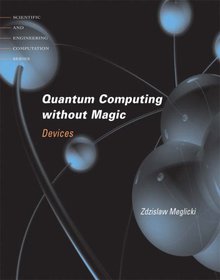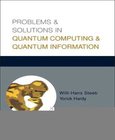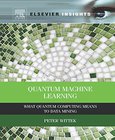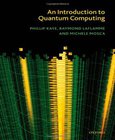Quantum Computing Without Magic
Devices

Book Details:
| Publisher: | The MIT Press |
| Series: | MIT Press |
| Author: | Zdzislaw Meglicki |
| Edition: | 1 |
| ISBN-10: | 026213506X |
| ISBN-13: | 9780262135061 |
| Pages: | 448 |
| Published: | Aug 01 2008 |
| Posted: | Nov 19 2014 |
| Language: | English |
| Book format: | |
| Book size: | 8.16 MB |
Book Description:
This text offers an introduction to quantum computing, with a special emphasis on basic quantum physics, experiment, and quantum devices. Unlike many other texts, which tend to emphasize algorithms, Quantum Computing without Magic explains the requisite quantum physics in some depth, and then explains the devices themselves. It is a book for readers who, having already encountered quantum algorithms, may ask, "Yes, I can see how the algebra does the trick, but how can we actually do it?" By explaining the details in the context of the topics covered, this book strips the subject of the "magic" with which it is so often cloaked. Quantum Computing without Magic covers the essential probability calculus; the qubit, its physics, manipulation and measurement, and how it can be implemented using superconducting electronics; quaternions and density operator formalism; unitary formalism and its application to Berry phase manipulation; the biqubit, the mysteries of entanglement, nonlocality, separability, biqubit classification, and the Schroedinger's Cat paradox; the controlled-NOT gate, its applications and implementations; and classical analogs of quantum devices and quantum processes. Quantum Computing without Magic can be used as a complementary text for physics and electronic engineering undergraduates studying quantum computing and basic quantum mechanics, or as an introduction and guide for electronic engineers, mathematicians, computer scientists, or scholars in these fields who are interested in quantum computing and how it might fit into their research programs.
Download Link:
Related Books:
Problems & Solutions in Quantum Computing & Quantum Information
Quantum computing and quantum information are two of the fastest-growing and most exciting research areas in physics. The possibilities of using non-local behaviour of quantum mechanics to factorize integers in random polynomial time have added to this new interest. This invaluable book provides a collection of problems in quantum computing and quantum information together with detailed solutions. It consists of two parts: in the first part finite-dimensional systems are considered, while the second part deals with finite-dimensional systems. All the important concepts and topics are included, such as quantum gates and quantum circuits, entanglement, teleportation, Bell states, Bell inequality, Schmidt decomposition, quantum Fourier transform, magic ...
Quantum Machine Learning
What Quantum Computing Means to Data Mining
Quantum Machine Learning bridges the gap between abstract developments in quantum computing and the applied research on machine learning. Paring down the complexity of the disciplines involved, it focuses on providing a synthesis that explains the most important machine learning algorithms in a quantum framework. Theoretical advances in quantum computing are hard to follow for computer scientists, and sometimes even for researchers involved in the field. The lack of a step-by-step guide hampers the broader understanding of this emergent interdisciplinary body of research. Quantum Machine Learning sets the scene for a deeper understanding of the subject for readers of different backgrounds. The author has carefully constructed a clear comparison of cl...
An Introduction to Quantum Computing
This concise, accessible text provides a thorough introduction to quantum computing - an exciting emergent field at the interface of the computer, engineering, mathematical and physical sciences. Aimed at advanced undergraduate and beginning graduate students in these disciplines, the text is technically detailed and is clearly illustrated throughout with diagrams and exercises. Some prior knowledge of linear algebra is assumed, including vector spaces and inner products. However, prior familiarity with topics such as tensor products and spectral decomposition is not required, as the necessary material is reviewed in the text....
2007 - 2021 © eBooks-IT.org



